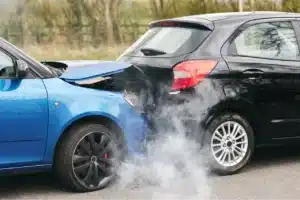 Rear-end accidents are far more than mere fender benders. In fact, they are some of the most common and dangerous crashes on our roads in Florida. Many people think the rear driver is always at fault, and generally – but not always – this conception is true. Read below to learn more about the rear-end collision Florida Law
Rear-end accidents are far more than mere fender benders. In fact, they are some of the most common and dangerous crashes on our roads in Florida. Many people think the rear driver is always at fault, and generally – but not always – this conception is true. Read below to learn more about the rear-end collision Florida Law
If you’ve suffered an injury in a rear-end collision, don’t wait to consult with an experienced Florida car accident attorney.
Determining Fault for Rear-End Accidents
Rear-end accidents are often the result of negligence on the part of the rear driver, such as when the motorist behind you is speeding or is dangerously distracted.
Such drivers fail to allow themselves the distance, the time, or even the degree of attention that is necessary to stop in time to avoid a rear-end accident when a forward vehicle stops suddenly – or simply comes to a stop at a stop sign in the case of some distracted drivers.
There are, however, instances when the forward motorist is at fault – or shares fault – for the rear-end crash.
Pulling out directly in front of you
If another motorist blasts into the space ahead of you, then screeches to a sudden stop or fails to keep up with the speed you’ve already achieved, they can be held responsible for a rear-end accident.
Motorists are not afforded the right to take any spot on the road and expect other drivers to accommodate them somehow. Instead, drivers are required to refrain from pulling onto a road until it is safe to do so.
Making a hasty turn
When drivers make turns, they are required to alert the motorists behind them to their intentions by slowing down appropriately and using their turn signals, and when they fail to do so, the rear drivers can be blindsided.
If the motorist in front of you fails to slow down or to use their blinker only to take a turn out of nowhere, it can cause or contribute to a rear-end accident.
Having faulty lights
Even if the driver who is ahead of you employs their turn signal prior to turning or uses their brakes to slow down appropriately in response to something ahead, it does not do you much good if their turn signal or brake lights are not working.
Motorists are responsible for maintaining their vehicles in a roadworthy condition, including having working brake lights and blinkers.
Braking suddenly
Distracted drivers fail to pay adequate attention to the road ahead, and as a result, they sometimes have to stop on a dime – or attempt to stop on a dime – in response to a forward hazard. By allowing those behind them no fair warning, they significantly increase the risk of a rear-end accident.
There are even situations in which whoever is responsible for the risk ahead – such as a pedestrian who pops up where they shouldn’t be or a landowner who allows an animal to wander onto the road – can bear responsibility for any accidents that ensue, including rear-end accidents.
And yes, brake checking is a form of aggressive driving that is illegal in Florida.
Shared Fault in Rear-End Collisions
Rear-end collision Florida laws, which relate to every kind of vehicle, apportion fault according to the degree of responsibility each driver bears.
Consider the following examples:
- If you are driving along, obeying all the rules of the road, and an aggressive driver who is weaving in and out of traffic at top speed barrels into the back of your car, that driver is almost certainly 100 percent at fault.
- If, however, you are driving a bit over the speed limit and are forced to come to an abrupt stop in response to a forward danger, you may bear a small portion of responsibility for a resulting rear-end accident with a rear vehicle because of your excess speed, and your compensation will be reduced by the percentage of fault assigned to you.
- Finally, if the car ahead of you comes to a screeching and sudden stop for no good reason, they may be held completely responsible for a resulting rear-end accident in which you were obeying the rules of the road but simply could not stop quickly enough.
What to Do When Someone Rear-Ends You
If you’ve been rear-ended due to a driver’s negligence in Florida, there are several important steps you should take, including:
- Stop and exchange contact and insurance information with the at-fault driver.
- Seek medical attention as soon as possible and follow your doctor’s instructions carefully. Whiplash and other soft tissue injuries can be slow to present with symptoms but require medical care.
- Consult with a practiced car accident attorney and carefully follow their advice, which is likely to include leaving the communication with the insurance company to them and staying off social media while your claim is pending.
Injuries That Are Common to Rear-End Accidents
While a rear-end accident can cause nearly any kind of injury, some of the most common include:
- Broken bones in the feet or lower legs
- Soft tissue injuries, particularly in the neck, such as whiplash
- Spinal cord injuries
An Experienced Boca Raton Car Accident Attorney Can Help You Understand the Rear-End Collision Florida Law
Our Boca Raton car accident attorneys at Eltringham Law Group have a wealth of experience successfully guiding complex rear-end accident claims like yours toward advantageous outcomes who is at fault for a rear-end collision
Learn more by contacting us online or calling us at 561-944-6746 today.
Rear-End Accident Case FAQs
Who is usually at fault for a rear-end collision?
Fault in every rear-end accident is determined in accordance with the facts, and either the front driver or the rear driver can bear all the fault – or they can share fault.
What happens when a fault is shared?
The compensation that the motorist who bears the least fault receives will be reduced by the percentage of fault they bear.
Can the forward driver ever be completely at fault?
Yes, if the forward motorist’s negligence was the only reason the rear-end accident happened, all fault in the matter can rest with them.
Last updated Wednesday, May 22nd, 2024

 Rear-end accidents are far more than mere fender benders. In fact, they are some of the most common and dangerous crashes on our roads in Florida. Many people think the rear driver is always at fault, and generally – but not always – this conception is true. Read below to learn more about the rear-end collision Florida Law
Rear-end accidents are far more than mere fender benders. In fact, they are some of the most common and dangerous crashes on our roads in Florida. Many people think the rear driver is always at fault, and generally – but not always – this conception is true. Read below to learn more about the rear-end collision Florida Law




